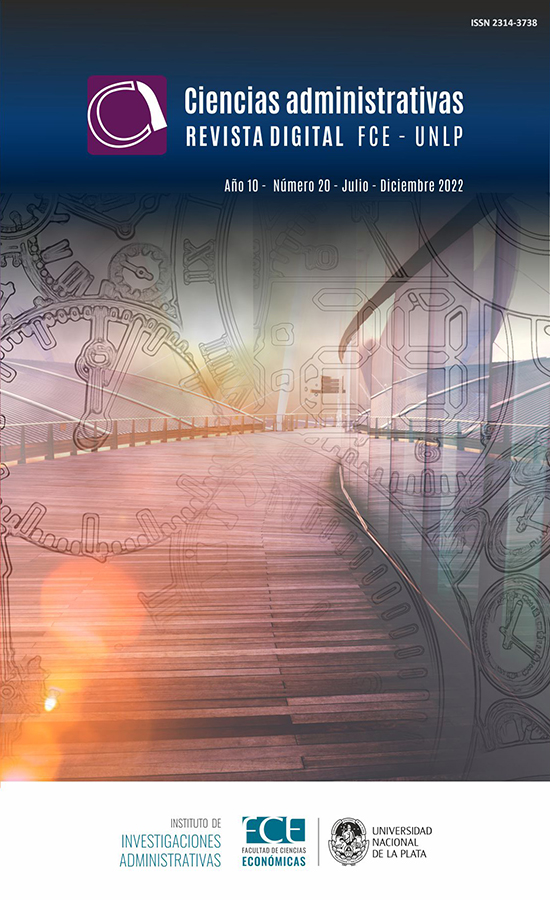Desde la Perspectiva del Ceo: Competencias Críticas para un Desempeño Efectivo
DOI:
https://doi.org/10.24215/23143738e104Palabras clave:
CEO, competenciasResumen
El objetivo principal de esta investigación ha sido identificar las competencias críticas requeridas para el desempeño efectivo en la posición de CEO en subsidiarias de empresas multinacionales, desde la perspectiva de los propios actores. Se han identificado once habilidades críticas, entre las cuales la más significativa es comunicación y relaciones interpersonales, utilizando un enfoque cualitativo consistente en entrevistas con treinta CEOs.
Descargas
Métricas
Citas
Argenti, P. A. (2017). Strategic Communication in the C-Suite. International Journal of Business Communication, 54(2), 146-160. https://doi.org/10.1177/2329488416687053
Bartlett, C., Ghoshal, S., & Birkinshaw, J. (2004). Transnational Management: Test, Cases, and Reading in Cross-Border Management (4th ed.). Irwin/McGraw-Hill.
Barlett, C., & Ghoshal, S. (1992). What is a Global Manager? Harvard Business Review, 70(5), 124-132.
Berber, N., & Lekovic, B. (2018). The impact of HR development on innovative performances in central and eastern European countries. Employee Relations, 40(5), 762-786. https://doi.org/10.1108/ER-08-2017-0188
Birkinshaw, J. (2001). Chapter 14: Strategy and Management in MNE Subsidiaries. In A. M. Rugman & T. L. Brewer (Eds.), Oxford Handbook of International Business (pp. 380-401). Oxford University Press. https://doi.org/10.1093/0199241821.003.0014
Birkinshaw, J., & Hood, N. (1998). Multinational Subsidiary Evolution: Capability and Charter Change in Foreign-Owned Subsidiary Companies. Academy of Management Review, 23(4), 773-795. https://doi.org/10.5465/amr.1998.1255638
Botelho, E. L., Powell, K., Kincaid, S., & Wang, D. (2017). What Sets Successful CEOs Apart. Harvard Business Review, 95(3), 70-77.
Boyatzis, R. (1982). The competent Manager: A model for effective performance. Wiley & Sons.
Brown, O., Paz-Aparicio, C., & Revilla, A. (2019). Leader’s communication style, LMX and organizational commitment: A study of employee perceptions in Peru. Leadership & Organization Development Journal, 40(2), 230-258. https://doi.org/10.1108/LODJ-03-2018-0129
Drucker, P. (2004, December 30). The American CEO. Wall Street Journal. https://www.wsj.com/articles/SB110436476581112426
Hurd, A. R., & McLean, D. D. (2004). An analysis of the perceived competencies of CEOs in public park and recreation agencies. Managing Leisure, 9(2), 96–110. https://doi.org/10.1080/13606710410001709626
Kaplan, S., Kebanov, M., & Sorensen, M. (2012). Which CEO Characteristics and Abilities Matter? The Journal of Finance, 67(3), 973-1007. https://doi.org/10.1111/j.1540-6261.2012.01739.x
Kotter, J. (2019). What effective general managers really do. In R. Stewart (Ed.), Managerial Work (137–148). Routledge. doi:10.4324/9780429398599-8
Kouzes, T., & Posner, B. (2019). Influence of managers’ mindset on leadership behavior. Leadership & Organization Development Journal, 40(8), 829-844. https://doi.org/10.1108/LODJ-03-2019-0142
Lafley, A. (2009). What Only the CEO Can Do. Harvard Business Review, 87(5), 54-62.
Levy-Leboyer, C. (1997). Gestión de las competencias. Gestión 2000.
Maidique, M., Atamanik, C., & Perez, R. (2014). The Six Competencies of a CEO. Leader to Leader, (71), 31–37. https://doi.org/10.1002/ltl.20111
McClelland, D. C. (1973). Testing for competence rather than intelligence. American Psychologist, 28(1), 1-14. https://doi.org/10.1037/h0034092
McLean, D., Hurd, A., & Jensen, R. (2005). Using Q-methodology in competency development for CEOs in public parks and recreation. Managing Leisure, 10(3), 156–165. https://doi.org/10.1080/13606710500239012
Paksoy, M., Soyer, F., & Çalık, F. (2017). The impact of managerial communication skills on the levels of job satisfaction and job commitment. Journal of Human Sciences, 14(1), 642-652. https://doi.org/10.14687/jhs.v14i1.4259
Penley, L., Alexander, E., Jernigan, I., & Henwood, C. (1991). Communication Abilities of Managers: The Relationship to Performance. Journal of Management, 17(1), 57-76. https://doi.org/10.1177/014920639101700105
Quelch, J., & Bloom, H. (1996). The Return of The Country Manager. The McKinsey Quartlerly, (2), 30-43.
Radovic Markovic, M., & Salamzadeh, A. (2018). The Importance of Communication in Business Management. The 7th International Scientific Conference on Employment, Education and Entrepreneurship, Belgrade, Serbia. https://ssrn.com/abstract=3578378
Schein, E. (1988). La cultura empresarial y el liderazgo. Plaza & Janes.
Spencer, S. M., Rajah, T., Mohan, S., & Lahiri, G. (2008). The Indian CEOs: Competencies for success. Vision, 12(1), 1–10. https://doi.org/10.1177/097226290801200102
Spencer, L., & Spencer, S. (1993). Competence at Work. John Wiley and Sons.
Wood, J., & Vilkinas, T. (2007). Characteristics associated with CEO success: perceptions of CEOs and their staff. Journal of Management Development, 26(3), 213-227. http://dx.doi.org/10.1108/02621710710732128
Zapata, G., Mirabal, A., & Canet, M. T. (2015). El entorno de la organización: Un estudio de sus tipologías y su vinculación con la percepción directiva y el diseño organizativo. Ciencia y Sociedad, 40(4), 785-822. https://doi.org/10.22206/cys.2015.v40i4.pp785-822
Descargas
Archivos adicionales
Publicado
Cómo citar
Número
Sección
Licencia
Derechos de autor 2022 Fernando Troilo

Esta obra está bajo una licencia internacional Creative Commons Atribución-NoComercial-CompartirIgual 4.0.
Aquellos autores/as que tengan publicaciones con esta revista, aceptan los términos siguientes:
- Los autores/as conservarán sus derechos de autor y garantizarán a la revista el derecho de primera publicación de su obra, el cuál estará simultáneamente sujeto a la Creative Commons Atribución-NoComercial-CompartirIgual 4.0 Internacional (CC BY-NC-SA 4.0) que permite a terceros compartir la obra siempre que se indique su autor y su primera publicación esta revista, no hagan uso comercial de ella y las obras derivadas de hagan bajo la misma licencia.
- Los autores/as podrán adoptar otros acuerdos de licencia no exclusiva de distribución de la versión de la obra publicada (p. ej.: depositarla en un archivo telemático institucional o publicarla en un volumen monográfico) siempre que se indique la publicación inicial en esta revista.
- Se permite y recomienda a los autores/as difundir su obra a través de Internet (p. ej.: en archivos telemáticos institucionales o en su página web) antes y durante el proceso de envío, lo cual puede producir intercambios interesantes y aumentar las citas de la obra publicada. (Véase El efecto del acceso abierto).


































